In April, China's blockchain standard construction speeds up the application of large-scale landing and adds another puzzle
Source: Interchain Pulse
Author: Kim go car
Recently, the construction of domestic blockchain standards has accelerated.
Since April, 2 national standards for blockchain have been approved; 1 national standard for anti-counterfeiting and traceability has made clear requirements for the application of blockchain in this field; 1 "blockchain + epidemic prevention and control" provincial level The standard was approved for publication; in addition, the Hangzhou Karate Association also stated that it will establish a series of new industry standards in blockchain + karate.
- "Epic" fund CXC issued a new currency: claimed to be zero-cost mining, actually paid back in 19 years
- Technical Guide | How does Poka's NPoS mechanism work?
- Opinion | Monetization of Bitcoin and Ethereum: Who can be the next world currency?
According to the observation of the inter-chain pulse, not only the number of domestic blockchain related standards has increased, but also a clear standard system has been formed. At the beginning of April, the two national standards led by Zhongan Technology and Annie, respectively, and the first blockchain national standard approved by China in 2017 belong to this standard system framework.
The 1024 speech emphasized that it is necessary to strengthen the research on blockchain standardization and enhance the power of international discourse and rule-making … In April, the speed of standard construction will add another puzzle to the large-scale application of the application.
China's blockchain standard system is clear
Recently, the national standards led by Zhongan Technology and Anne Co., Ltd. are "Code of Practice for Information Technology Blockchain and Distributed Accounting Technology Smart Contracts" (hereinafter referred to as "Code of Practice for Smart Contracts"), "Code of Information Technology Blockchain and Distribution Application Guide of Digital Accounting Technology Depository (hereinafter referred to as "Guide to Application of Depository Certificate").
One or two can be known from the standard name. "Smart Contract Implementation Specification" is an implementation process designed to unify and standardize the construction, triggering, operation and evaluation of smart contracts, and to improve the consistency and standardization of smart contracts; 》 The purpose is to guide the establishment, implementation, protection and improvement of the blockchain certification system, and to regulate the design, development, deployment, testing, operation and maintenance of blockchain certification applications.
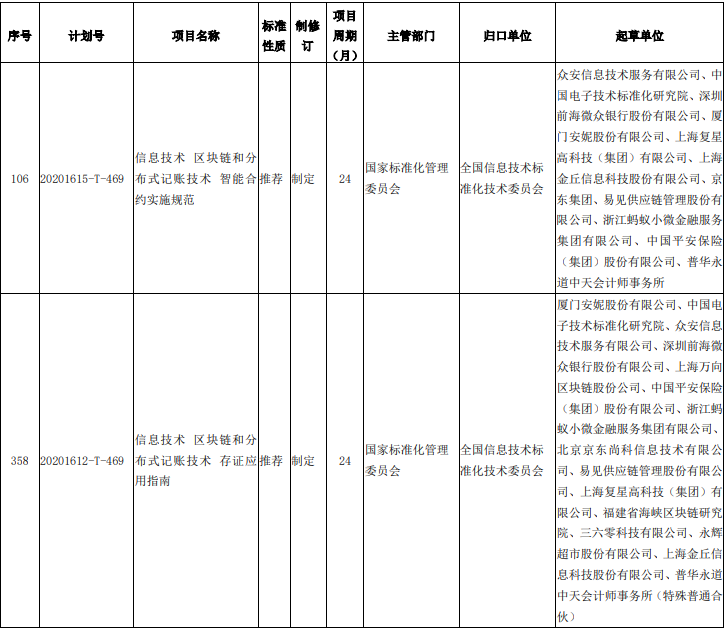
The contents of these two national standards are based on the two group standards of "Blockchain Smart Contract Implementation Specification" and "Blockchain Certificate Application Guide" issued by China Blockchain Technology and Industry Development Forum in 2018.
Inter-Chain Pulse Watch, this forum for advancing the construction of blockchain standards, has been established as early as 2016, and has assembled the top companies in the domestic blockchain field. The chairman unit of the forum is the China Electronics Technology Standardization Institute (hereinafter referred to as the Institute of Electronic Standards), which is affiliated to the Ministry of Industry and Information Technology; the deputy chairman units are Zhongan Technology and Anne Co., Ltd., which lead the national standards, in addition Public Bank, Ping An Group, Easeshare, Jinqiu, JD, PricewaterhouseCoopers, Baidu, Tencent, etc. are all its member units.
And before the two national standards approved in April, the China Blockchain Technology and Industry Development Forum has promoted the approval of the first national standard in the field of blockchain. In May 2017, the forum released blockchain Group standard "Blockchain Reference Architecture". In December of the same year, based on this group standard, the National Institute of Electronic Standards took the lead in preparing, and the national standard for the "Information Technology Blockchain and Distributed Ledger Technology Reference Architecture" (hereinafter referred to as "Reference Architecture") developed by more than 30 domestic companies was approved .
As an important basic standard in the blockchain field, "Reference Architecture" gives important terms and definitions related to blockchain, specifies the reference architecture, typical characteristics and deployment modes of blockchain and distributed ledger technology, and describes the area. The blockchain ecosystem has guiding significance for the application of blockchain services and the construction of blockchain systems in various industries.
It can be said to open the domestic blockchain standard ecology. It was also shortly thereafter that the Institute of Electronic Standards further promoted the formation of the Blockchain Standardization Technical Committee and focused on building a standard framework for blockchain.
The “National Professional Standardization Technical Committee Preparation Application” completed by the Institute of Electronic Standards in May 2018 shows that the Ministry of Industry and Information Technology intends to declare the establishment of the National Blockchain and Distributed Accounting Technology Standardization Technical Committee. The declaration of this committee was implemented in 2019. In November 2019, the National Standards Committee announced the establishment of a number of national professional standardization technical committees, including the Blockchain Technical Committee.
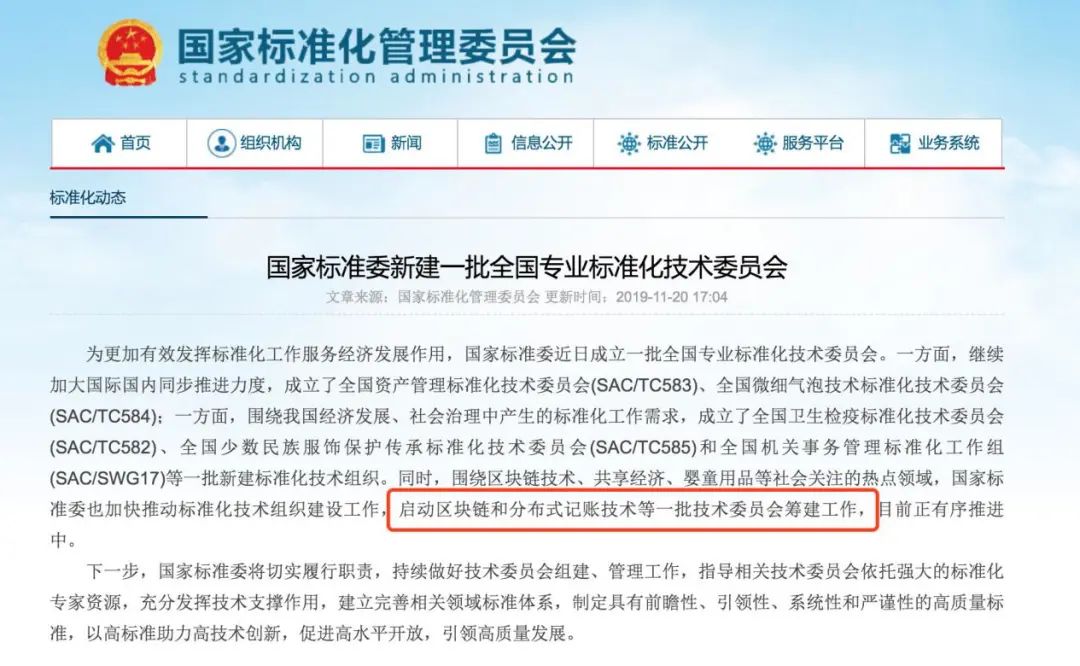
Also in this preparatory application, the Institute of Electronic Standards introduced the system plan for the national standard of blockchain. The blockchain standard system framework includes five types of standards including foundation, business and application, process and method, credibility and interoperability, and information security, and 22 national standards are planned to be promoted according to the system. This standard framework and planning was also proposed in the "China Blockchain Technology and Application Development White Paper" released by the China Blockchain Technology and Industry Development Forum in 2016.
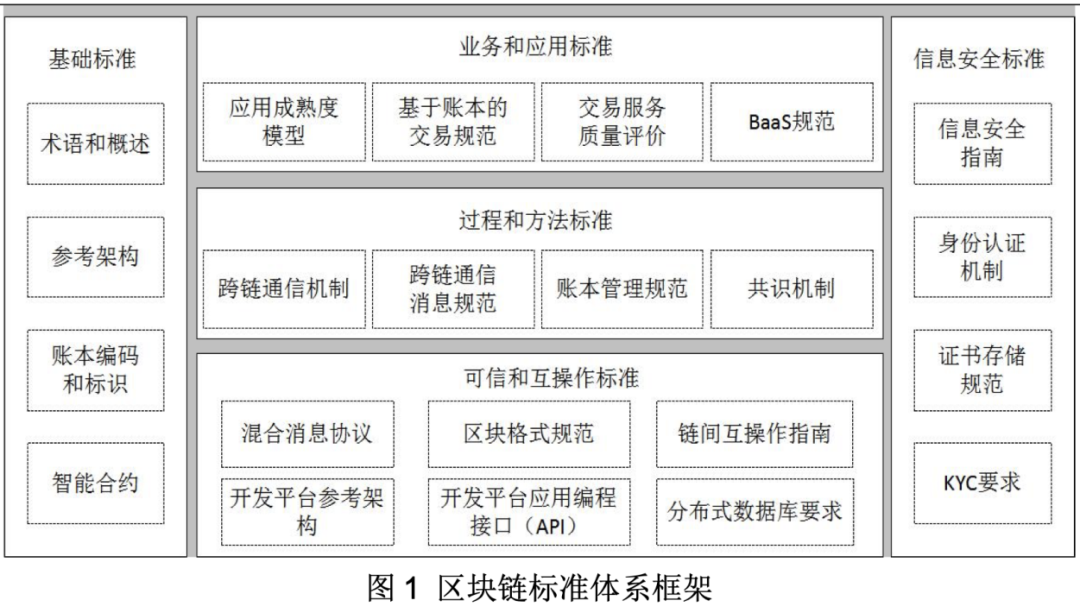
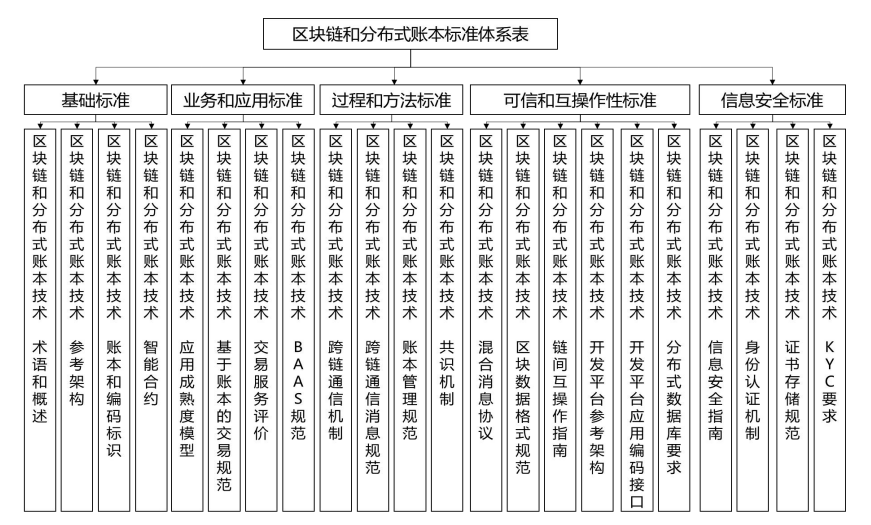
According to the standard system table, the two recently approved national standards are basic standards, business and application standards. At the same time, the mutual chain pulse is concerned that in addition to the three national standard prototypes that have been approved, the official website of the China Blockchain Technology and Industry Development Forum also shows that from December 2017 to December 2019, the forum Seven other standards including the "Blockchain Data Format Specification", "Blockchain Privacy Protection Specification", and "Blockchain Cross-chain Implementation Guide" were released.
This means that more national standards for blockchain have been prepared for basic research and development, and are ready to go.
Seize the right to speak internationally on the blockchain
Special national standards for blockchain have seen the system and scale. On the other hand, local standards for blockchain, standards for combining blockchain with various fields are also constantly developing.
On April 8th, the first "blockchain + epidemic prevention and control" standard was born in Jinan. The provincial local standard of "Guide to the Construction of Information Service Platform for Epidemic Prevention and Control Based on Blockchain Technology" was led by Shanda Diwei. , Its release and implementation provide a "methodology" for government departments to quickly build efficient and credible information channels, timely grasp real data, and achieve precise measures when responding to social emergencies such as epidemics.
The inter-chain pulse is concerned that the methodology does have a certain practical basis. During the outbreak, Shandadiwei participated in the blockchain war "epidemic" operation. On February 6 this year, Shandadiwei had worked with Shandong Province. Together with the Jinan Municipal Government, Jinan epidemic prevention and control platform was launched.
In addition to this local standard of blockchain, enterprises and institutions are also actively incorporating blockchain technology into standards in multiple industries.
On April 7, issued by the State Administration of Market Supervision and Administration and the National Standardization Management Committee, the National Anti-Counterfeiting Standardization Technical Committee proposed that the National Standard for "General Technical Conditions for Anti-counterfeiting Traceability Verification Based on Mobile Internet" drafted by the China National Defense Association and Baidu and other companies formally release.
In this anti-counterfeiting traceability standard, Baidu Superchain Innovation proposed the combination of RFID + blockchain, save the history and results of RFID scanning to the blockchain, and define the relevant interaction methods of the blockchain. adoption. This is the first national standard for blockchain to enter the anti-counterfeiting traceability category.
In addition, on April 12, it was reported that the Hangzhou Karate Association used blockchain technology for the first time to prove the "winning certificate" of the competition with a unique digital fingerprint identity. In the future, the association will establish a series of new industry standards in blockchain + karate.
In February of this year, the central bank also released the “First Blockchain Standard in the Domestic Financial Industry” and the “Security Specification for Financial Distributed Ledger Technology”. Blockchain institutions and projects have proposed more formal specifications and requirements.
From national ministries and commissions to enterprises and associations, they are actively participating in the establishment of current blockchain standards. The establishment of inter-chain pulse statistics before the establishment of domestic blockchain industry standards and group standards was mostly initiated by organizations such as CCIT and CCSA. As of the statistical data of 2019, more than 20 blockchain industry standards and group standards have been published in China. In addition, Chinese institutions and enterprises have participated in and jointly edited a number of international standards.
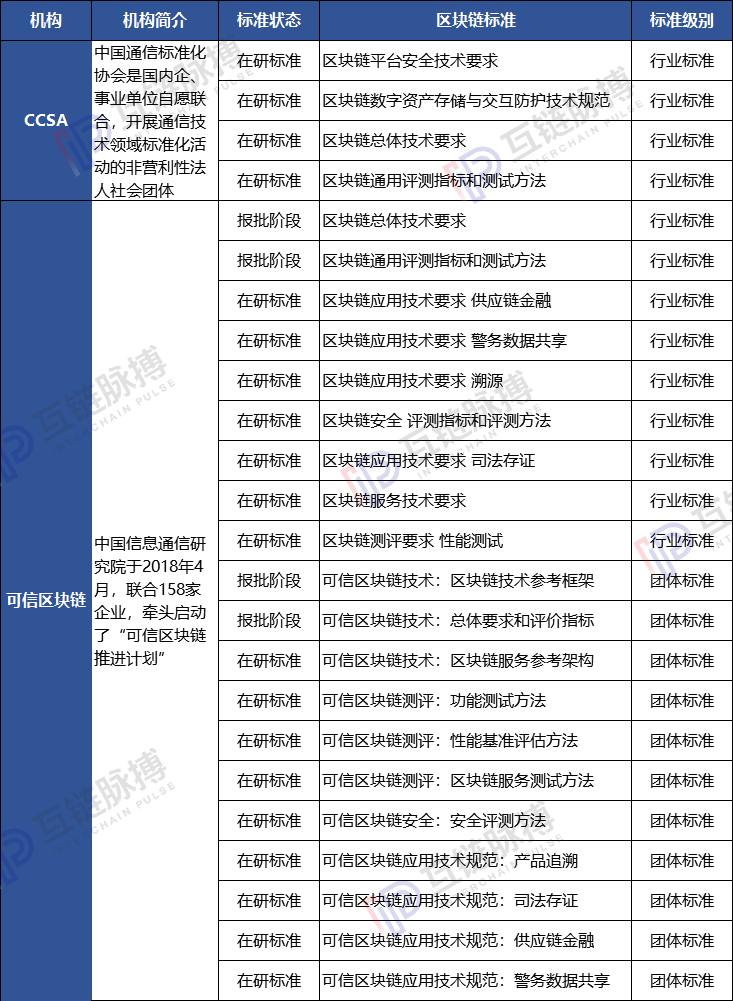
At present, domestic blockchain standards have been gradually rolled out around the national standard system and touched on multiple specific industry areas.
In fact, the domestic blockchain field has risen to a national strategic height after experiencing a trough of frantic development and bubble bursting, and is now in a critical period of vigorous development. To build blockchain standards at this stage, one is to build the infrastructure for blockchain development, unify the industry's understanding of blockchain, standardize and guide the application of blockchain in various fields, and improve the domestic blockchain industry ecology.
On the other hand, it is to enhance China's competitiveness in the field of blockchain technology, and further enhance China's international discourse power and rule-making power.
We will continue to update Blocking; if you have any questions or suggestions, please contact us!
Was this article helpful?
93 out of 132 found this helpful
Related articles
- Babbitt Column | Cai Weide: Blockchain is used for credit information to build a "Taoyuan World"
- Introduction to Blockchain | Why do miners overclock and downclock?
- Viewpoint | The Cyber Revolution in the Digital Securities Industry: How Can Sovereign Digital Identity Bring New Liquidity to Digital Securities?
- Blockchain Weekly | Tesla, Nestlé and other big companies apply blockchain; BCH and BSV are both halved
- Introduction | Cryptocurrency Derivatives and the World of Digital Financial Assets
- Babbitt's weekly selection 丨 BCH halving failed to promote the rise, halving effect is exclusive to Bitcoin; DeFi "Big Bang" or coming
- Observation | Hunan is building a 100 billion-level blockchain industrial park, and Shandong, Chongqing and other four provinces are gaining momentum






